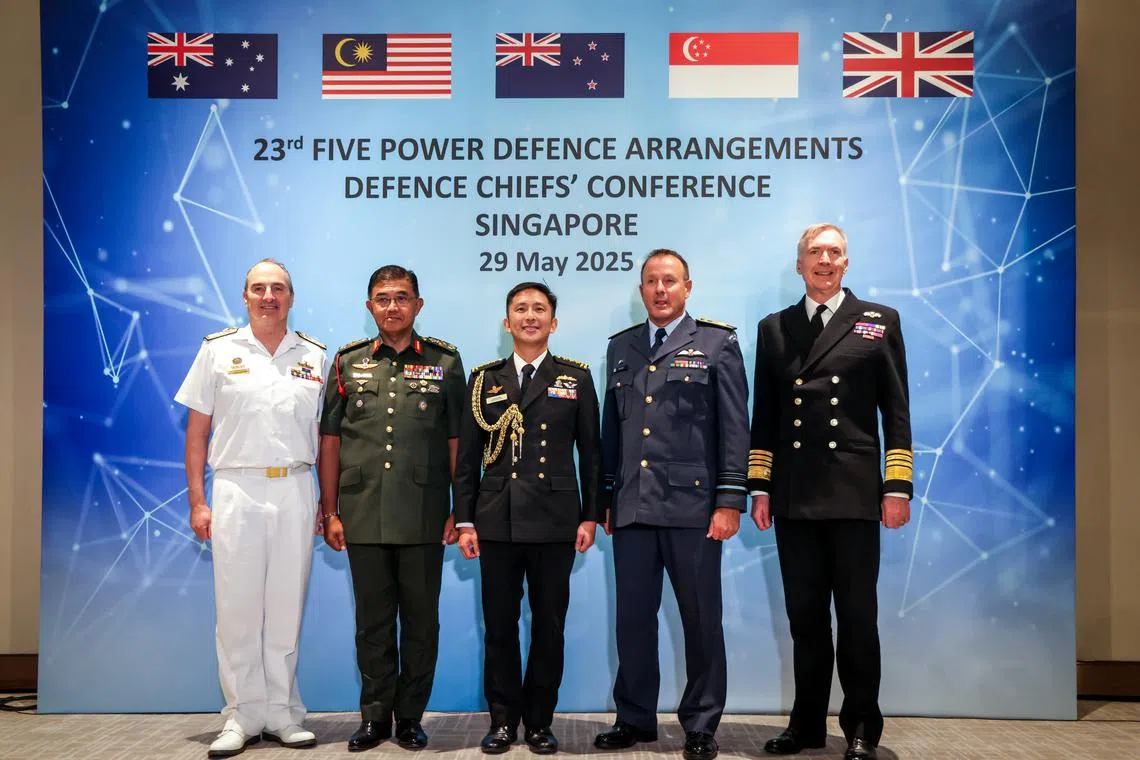FPDA defence chiefs pledge to keep grouping relevant, discuss protection of subsea infrastructure
Sign up now: Get ST's newsletters delivered to your inbox

Singapore’s Chief of Defence Force Aaron Beng (centre) with his counterparts (from left) Australia's Admiral David Johnston, Malaysia’s General Mohd Nizam Jaffar, New Zealand’s Air Marshal Tony Davies and UK's Admiral Tony Radakin at the FPDA Defence Chiefs' Conference on May 29.
PHOTO: LIANHE ZAOBAO
Follow topic:
SINGAPORE – The defence chiefs of Australia, Malaysia, New Zealand, Singapore and the United Kingdom have reaffirmed their countries’ commitment to keeping the Five Power Defence Arrangements (FPDA) relevant and contributing to regional peace and security.
This means maintaining the momentum of the grouping’s regular exercises and enhancing the militaries’ ability to operate well together, while also looking at ways to do more to counter emerging security threats, including to Asia’s undersea infrastructure such as power and data cables, they said after their meeting on May 29.
Speaking to reporters after the 23rd FPDA Defence Chiefs’ Conference (FDCC) at Conrad Orchard Hotel, Singapore’s Chief of Defence Force Aaron Beng said the five countries had discussed putting additional focus on this “very fast evolving” area of threat, given the significant amount of underwater infrastructure in Asia.
The defence chiefs had been asked whether protecting such infrastructure was a priority, given plans by both Singapore and Malaysia to become hubs for digital infrastructure such as data centres.
“As FPDA has always done in the past, we will continue to look at emerging threats, the capabilities that all the nations have, the concerns that all the nations have, and evolve our activities to meet the needs,” said Vice-Admiral Beng.
The FPDA first took form in 1971 to safeguard the external defence of Singapore and Malaysia, amid the withdrawal of British forces from Singapore. The FDCC serves as the highest professional military forum of the FPDA.
In a joint statement issued after the FDCC, the five defence chiefs reaffirmed conventional exercises as the cornerstone of FPDA cooperation, as they enhance interoperability among member nations’ militaries while strengthening multilateral ties.
The FPDA has stayed relevant by adapting to contemporary security challenges, with its exercises having evolved to include elements such as maritime security, counter-terrorism, humanitarian assistance and disaster relief to complement regular large-scale conventional serials, it added.
Serials are specific, planned activities or manoeuvres conducted during military exercises.
At the media doorstop, UK Chief of Defence Staff Tony Radakin and his Australian counterpart, Admiral David Johnston, both emphasised that the FPDA’s relevance is likely the strongest that it has ever been in its 54-year history.
Admiral Radakin said it was “extraordinarily relevant” that 2025 was the first time in a decade that all five nations’ defence chiefs attended the FDCC, and also the first time since 1997 that a UK aircraft carrier is exercising as part of the FPDA.
In earlier editions of the FDCC, which is hosted alternately by Malaysia and Singapore, countries have sometimes been represented by their vice-chief of defence force.
The HMS Prince of Wales, the flagship of the UK’s Carrier Strike Group 2025, had set sail from Portsmouth for the Indo-Pacific in late April.
On keeping the FPDA relevant, the defence chiefs highlighted how joint exercises have evolved to incorporate the various militaries’ cyber and uncrewed capabilities, and that the grouping will continue to look at emerging threats, such as to underwater infrastructure.
Malaysia’s Chief of Defence Force Mohd Nizam Jaffar said their discussions covered the sort of action that the nations could take against sabotage of such infrastructure.
New Zealand’s Chief of Defence Force Tony Davies said this is an area of focus for his government’s defence capability planning for the next 15 years, and that protection of such infrastructure will require both hardware capabilities and rules and governance.
Adm Radakin said part of the FPDA’s strength is in knowledge sharing, and that he had been able to share information on how the UK is tackling this threat from a European perspective.
In their joint statement, the FPDA said member nations’ inclusion of next-generation capabilities in their multilateral exercises exemplifies the “unity and strength” of the grouping.
Besides the UK’s Carrier Strike Group, Australia’s F-35 fighter jets will feature in the next FPDA exercise – Exercise Bersama Lima 2025 – in September.
The defence chiefs were also asked how the FPDA views its role in maintaining regional security, given the recalibration of US influence in the region.
In response, VADM Beng said the FPDA has seen a lot of evolution and change in the region in its 54-year history.
“I don’t think, on the military front, we see too much adjustment to the US’ force posture as of now,” he said.
“On our end, I think the goal is to continue to keep ourselves strong among this grouping, to keep ourselves interoperable, and to ensure that the momentum of our activities and exercises continue so that we are ready to face whatever challenges come ahead.”
Earlier in the day, the defence chiefs called on Singapore Defence Minister Chan Chun Sing, who had taken on his portfolio on May 23.
In a Facebook post on May 29, Mr Chan said he looked forward to working closely with his counterparts to ensure that the FPDA remains relevant in an ever-changing security landscape.
The grouping will continue to adapt to contemporary challenges by enhancing its exercises to incorporate non-conventional elements, with a focus on high-end warfighting and next-generation capabilities, he added.
Separately, Malaysia’s General Nizam called on Mr Chan on May 28, as part of his introductory visit to the Republic.
During their call, Mr Chan and Gen Nizam reaffirmed the warm and longstanding defence relations between Singapore and Malaysia, and the importance of deepening cooperation and ties between the two countries’ armed forces.
Wong Pei Ting is a correspondent at The Straits Times. She covers politics and social affairs.


